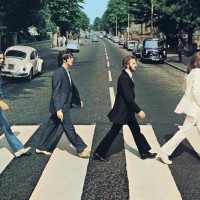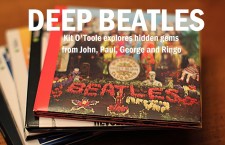Deep Beatles’ look at the Abbey Road medley continues with “You Never Give Me Your Money,” an obvious nod to the group’s legal and financial woes from their ill-fated venture Apple Corps. The track is a mini-epic in itself, a three-movement song addressing anger, despair, frustration, and the desire to escape. It may be a “fragment” included in the magnum opus, but it stands as one of Paul McCartney’s greatest performances and compositions.
McCartney began composing “You Never Give Me Your Money” in anger. As he told biographer Barry Miles: “This was me directly lambasting Allen Klein’s attitude to us: no money, just funny paper, all promises and it never works out. It’s basically a song about no faith in the person, that found its way into the medley on Abbey Road. John saw the humor in it.” Klein had recently become the Beatles’ manager, despite McCartney’s objections. McCartney appears to express his conflicting emotions within the song, which accounts for the wistful beginning, rhythm and blues middle, and full-out rock at the end.
After composing the track, McCartney and the Beatles entered Studio One at Olympic Sound Studios on May 6, 1969, recording an astonishing 36 takes of “You Never Give Me Your Money.” McCartney was on piano, John Lennon on distorted guitar, George Harrison on another guitar (the Beatles Bible site states the sound was fed through a revolving Leslie speaker), and Ringo Starr on drums. The group recorded the instrumental section live onto eight-track tape, with take 30 deemed the best. Since the Beatles and producer George Martin had yet to fit the track into the medley, the song abruptly ended after the nursery rhyme chant. At this point, McCartney had also recorded his guide vocal.
Almost two months passed before McCartney returned to the song, dubbing his lead vocals over take 30, according to the Beatles Bible. Two weeks later the group returned to Abbey Road Studios to add more vocals and instrumentation such as chimes. Interestingly, the Beatles then attempted to connect “You Never Give Me Your Money” to “Sun King,” ultimately deciding on a long organ note and additional harmonies. The next day, these vocals were eliminated, and McCartney alone completed the song by playing bass and piano.
However, the transition to “Sun King” still needed work so, on August 5, McCartney brought in homemade tape loops containing effects such as bird and cricket chirps. After two more attempts on August 14 and 21, the crossfade was finally completed. While just a fragment of the medley, “You Never Give Me Your Money” was a complicated recording in that it required multiple days for takes, overdubs, and mixing sessions.
Lyrically, the track contains a clear theme: wanting to be rid of “funny paper” and petty squabbles, and to return to the Beatles’ early days. The first section, introduced with restrained piano, apparently addresses Klein directly: “You never give me your money, you only give me your funny paper — and in the middle of negotiations, you break down.” Here he summarizes the anguish the entire band felt by rephrasing the last line as “I break down” in the next stanza. McCartney’s quiet vocals emphasize the pain, his voice double tracked to add drama. The next stanza features Harrison and Lennon harmonizing with McCartney, suggesting that they all shared in McCartney’s frustration.
Suddenly, the piano becomes strident, with Ringo Starr’s drums thumping through the quiet. McCartney assumes his Fats Domnino-like vocal, also present in such tracks as “Lady Madonna.” The music rumbles as he reminisces about earlier times, when money hadn’t entered the picture: “Out of college, money spent, see no future, pay no rent — all the money’s gone, nowhere to go,” he sings, expressing sentiments virtually everyone has experienced. While money may be short and jobs scarce, McCartney says, he loved that “magic feeling” of “nowhere to go.” In other words, he longs for the carefree days of youth; in his case, this may refer to the Beatles’ early days in Liverpool and Hamburg. Harrison, Lennon, and McCartney then harmonize wistfully, as if reveling in nostalgia.
The final section, the “sweet dream” part, advocates for escapism both physically and emotionally. McCartney’s voice soars, allowing some grittiness to creep into his singing. His dream involves taking off in a limousine, adding the devastating lines: “Soon we’ll be away from here. Step on the gas and wipe that tear away.” While those lines communicate freedom, they also express the prison that the group found themselves in during their final years together. Lennon and Harrison’s guitars cut through this tension, the sonic bursts of energy emulating breaking free — a theme McCartney would revisit often on his subsequent albums.
Since this is just a dream, the music slows and gradually fades as McCartney repeats the line “One sweet dream came true today.” Harmonies return as Harrison, Lennon, and McCartney chant the following nursery rhyme: “One, two, three, four, five, six, seven. All good children go to heaven.” What does this have to do with the overreaching theme? McCartney may have longed for returning to childlike innocence, of life not corrupted by money and power. Since the three croon the lines as if singing a lullaby, it could be simulating that state where one falls into a deeper sleep. Indeed, their vocals fade out as the guitars also become softer, the tweeting and chirping effects eventually taking over, creating a dreamlike state.
“You Never Give Me Your Money” is a rich track in many respects. It features one of McCartney’s finest vocal performances as well as the Beatles’ unparalleled harmonies. The meaning is complex, with the theme both depressing and uplifting. As usual, Starr anchors the song with his strong drumming style, effectively changing the entire mood of the song from introspective to bombastic. McCartney continues performing this song on his many tours, and no wonder: “You Never Give Me Your Money” may comprise just one part of the medley, but its sophistication and density stand alone.
- The Rescued Early Paul McCartney Song That Completed ‘Beatles For Sale’ - December 4, 2024
- A Rare Beatles Cover Proves John Lennon Was Wrong About His Voice - November 26, 2024
- How John Lennon Came Roaring Back on the Beatles’ White Album - November 22, 2023




What a song, what a recording. Vintage McCartney, flawless Beatles. The nursery rhyme bit at the end could also tie in thematically with the Golden Slumbers lullaby later on, though whether the connection was deliberate or an accident I couldn’t say. But you’re right, it’s a mini-suite of its own, a medley within The Medley. Brilliant.
Shelley, thanks for your comment. Indeed, the nursery rhyme could also tie in with “Golden Slumbers.” In my fantasy interview with Paul McCartney, I’d ask him about his original intention with that section. 🙂
This is an excellent analysis of “You Never Give Me Your Money,” a personal favorite. McCartney virtually jettisoned the standard verse – verse – chorus – verse
4 / 4 framework that was the usual structure for the genre
and laid it down. Against what was being released on vinyl
in 1969 – this had tremendous impact to the the listener.
“What the heck was that? Play it again!” was what I recall.
The nursery rhyme fade-out / evening / night sound effects segment “1-2-3-4-5-6-7…” has always been a bit eerie to me ever since I saw the photo of the Spahn Ranch glass door that had those words scrawled on it in Bugliosi’s Manson Family best seller “Helter Skelter.”
The door was in the LAPD property department and disappeared.